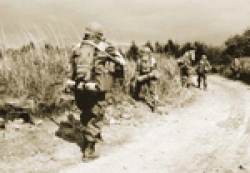
Published date
20 July 1988
The Angolan Civil War began in 1975, with the end of Portuguese colonial rule. This civil war was raged between two major factions, the Communist MPLA (Popular Movement for the Liberation of Angola - Party of Labour) and anti-communist UNITA (National Union for the Total Independence of Angola), and went on for 27 years.
South Africa entered the civil war by providing SADF troops to fight alongside UNITA. This was in an attempt to counter the spread of Communism in southern Africa, as it was perceived to be a huge threat to white and capitalist dominance in the southern African region.
Cuba, backed by the Soviet Union, provided troops and arms in support of MPLA, which, in turn, provided the South West Africa People's Organization (SWAPO) with access to military bases in Angola. SWAPO's aim was to rid Namibia (South West Africa) of South African political control, and thus used the Angolan military bases provided by the MPLA to launch attacks on the SADF. This resulted in massive SADF attacks on SWAPO's major bases.
Between 1979 and 1988, conflict between the UNITA and the MPLA continued, with both South Africa and Cuba providing troops to the opposing sides. South Africa and SWAPO continued to launch attacks against each other, with SWAPO attempting to infiltrate Namibia.
By 1988, both Cuba and South Africa had lost a significant amount of men, and the decision was made to withdraw their troops on 20 July 1988*. South Africa, Angola and Cuba then formally accepted the principles of an Angola/Namibia peace plan, which included independence for Namibia.
*The date of the signing of the agreement is given as 8 and 18 August by three other sources.
References
Kalley, J.A.; Schoeman, E. & Andor, L.E. (eds) (1999). Southern African Political History: a chronology of key political events from independence to mid-1997, Westport Greenwood.|
New York Principles [online] Available at: [Accessed 13 July 2009]| Angola and South West Africa - The Forgotten War [online] Available at:geocities.com[Accessed 15 July 2009]